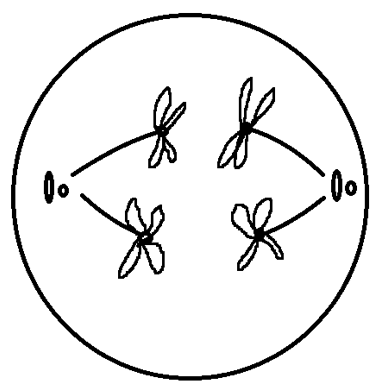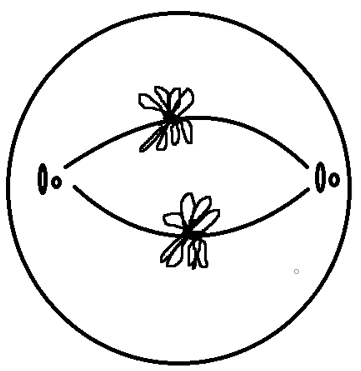This set of Class 11 Biology Chapter 10 Multiple Choice Questions & Answers (MCQs) focuses on “Cell Cycle and Division – Meiosis-2” for Medical Entrance Exams.
1. What is the enzyme involved in crossing over?
a) Isomerase
b) Invertase
c) Transferase
d) Recombinase
View Answer
Explanation: Crossing over or recombination takes place during the pachytene stage of prophase I. Crossing over is an enzyme-mediated phenomenon and the enzyme involved in this process is recombinase.
2. During which stage does the synaptonemal complex dissolve?
a) Leptotene
b) Pachytene
c) Diplotene
d) Zygotene
View Answer
Explanation: The synaptonemal complex is formed in the second stage of prophase I, that is, zygotene stage. After crossing over takes place during pachytene stage, the complex is dissolved during the diplotene stage.
3. What shape is the chiasmata?
a) S-shaped
b) Y-shaped
c) X-shaped
d) L-shaped
View Answer
Explanation: The chiasmata is an X-shaped structure formed by the bivalents or the tetrads during prophase I of meiosis I. It occurs due to the tendency of the homologous chromosomes of a tetrad to move away from each other.
4. At what stage can one visualize chiasmata?
a) Diplotene
b) Pachytene
c) Leptotene
d) Zygotene
View Answer
Explanation: Chiasmata is an X-shaped structure formed by the tetrad. It occurs due to the tendency of the homologous chromosomes of a tetrad to move away from each other except at the center. It occurs in the diplotene stage of prophase I.
5. During which stage does assembly of meiotic spindle take place?
a) Pachytene
b) Diakinesis
c) Metaphase I
d) Diplotene
View Answer
Explanation: Diakinesis is the last stage of prophase I of meiosis I during which the assembly of spindle fibers takes place. Diakinesis is also characterized by the disappearance of the X-shape of chiasmata.
6. Identify the phase of meiosis.

a) Anaphase II
b) Telophase II
c) Anaphase I
d) Telophase I
View Answer
Explanation: From the given diagram, we can observe that the chromosomes are moving towards the poles from the center. Hence, it is anaphase. Since it results in the separation of the tetrad, it is anaphase I.
7. Which of these is true about anaphase I?
a) Sister chromatids remain attached at the centromeres
b) Bivalent is unequally separated
c) Homologous chromosomes remain together
d) It takes place before diakinesis
View Answer
Explanation: During anaphase I of meiosis, the homologous chromosomes are separated and the bivalent is hence, equally divided. It takes place after diakinesis, which is a part of prophase I. Sister chromatids are not separated.
8. Which of these stages is characterized by the disappearance of the nucleolus?
a) Zygotene
b) Pachytene
c) Diplotene
d) Diakinesis
View Answer
Explanation: The disappearance of the nucleolus takes place during the last stage of prophase I, that is, diakinesis. This stage is also characterized by the disintegration of the nuclear membrane. It depicts transition to metaphase I.
9. During which stage of meiosis do the sister chromatids separate?
a) Telophase I
b) Anaphase I
c) Anaphase II
d) Telophase II
View Answer
Explanation: During anaphase I, the tetrad is divided and hence the homologous chromosomes are separated. However, the sister chromatids remain attached to each other. During anaphase II, the sister chromatids are separated.
10. Nuclear membrane does not appear at the end of anaphase I. True or false?
a) True
b) False
View Answer
Explanation: The nuclear membrane reappears at the end of anaphase I, during telophase I. Telophase I is also characterized by the appearance of the nucleolus, which was disintegrated during diakinesis.
11. Which of the following statements is false regarding interkinesis?
a) It is mostly short lived
b) It is followed by prophase II
c) It occurs after telophase I
d) Replication takes place
View Answer
Explanation: Interkinesis is the period between meiosis I and meiosis II. It is mostly short lived and occurs after telophase I. It is followed by prophase II. However, no DNA replication takes place during this period.
12. How do chromatids reach the poles of the cells during anaphase?
a) Action of centromeres
b) Disintegration of spindle fibers
c) Shortening of microtubules
d) Movement of arms of chromatids
View Answer
Explanation: During anaphase, the chromatids are separated and start moving towards the poles from the metaphase plate. This occurs by the shortening of the microtubules which pulls the chromatids towards the poles.
13. The stage preceding the stage during which crossing over takes place is ______
a) diplotene
b) pachytene
c) zygotene
d) leptotene
View Answer
Explanation: Crossing over and recombination takes place during the pachytene stage of prophase I. The stage preceding this is the zygotene stage which is characterized by the formation of the synaptonemal complex.
14. Which of these statements is true about meiosis I?
a) Crossing over leads to genetic variability
b) Diplotene is short lived in vertebrates
c) Diakinesis is followed by cytokinesis
d) Chiasmata formation occurs during metaphase I
View Answer
Explanation: Diplotene can last for years in some vertebrates, hence it is not always short lived. Diakinesis is followed by metaphase I. Chiasmata is formed during diplotene. Crossing over leads to genetic variation.
15. Identify the phase of meiosis.

a) Metaphase II
b) Metaphase I
c) Prophase II
d) Prophase I
View Answer
Explanation: In the diagram, it is observed that the bivalents or the tetrads are aligned towards the center of the cell, that is, on the metaphase plate. Hence, the given stage is identified to be metaphase I.
Sanfoundry Global Education & Learning Series – Biology – Class 11.
To practice Biology Questions for Medical Entrance Exams, here is complete set of 1000+ Multiple Choice Questions and Answers.
If you find a mistake in question / option / answer, kindly take a screenshot and email to [email protected]
- Practice Class 11 - Mathematics MCQs
- Practice Class 12 - Biology MCQs
- Practice Class 11 - Physics MCQs
- Check Class 11 - Books
- Practice Class 11 - Chemistry MCQs
